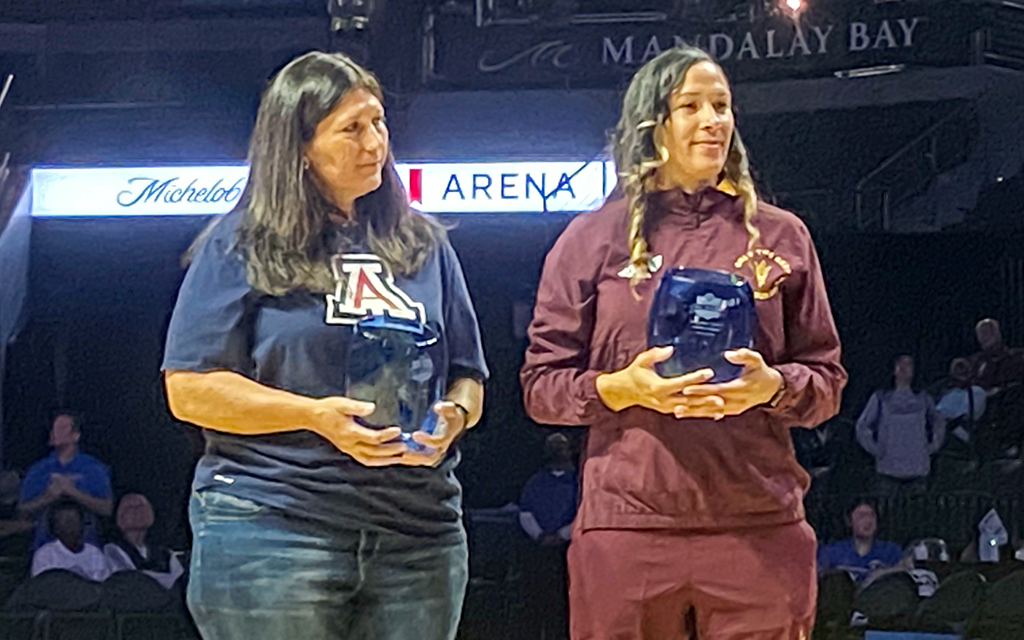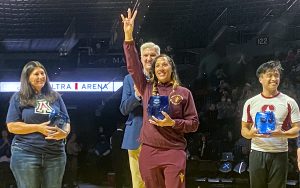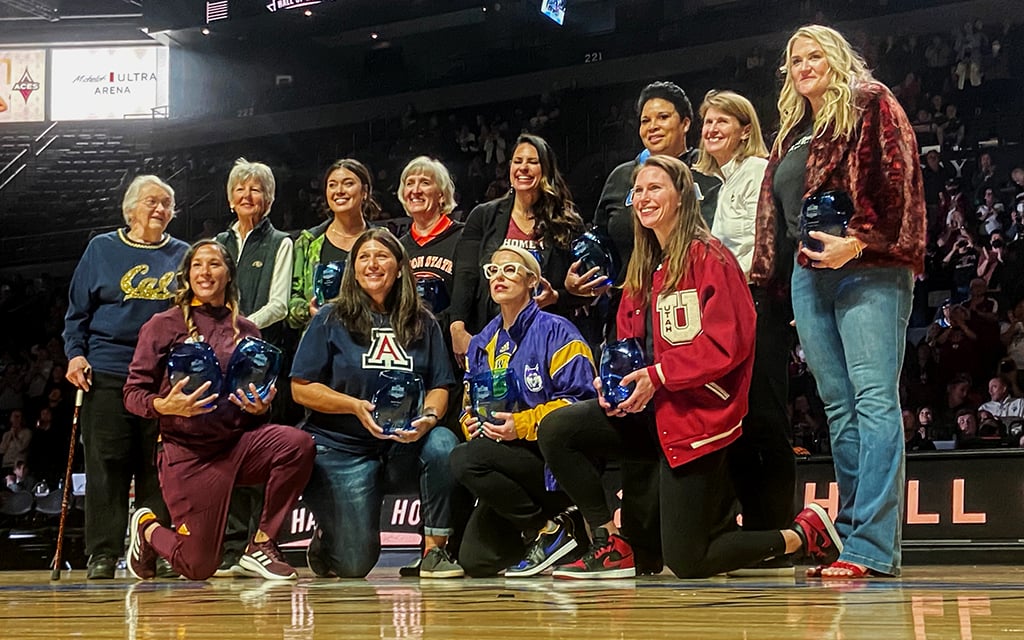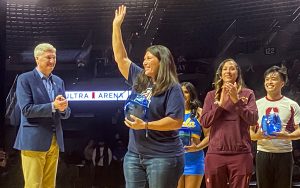
Former Arizona softball player Susie Parra, left, and Arizona State track and field athlete Jackie Johnson-Powell were among 12 Pac-12 Hall of Honor inductees. (Photo by Nicholas Hodell/Cronkite News)
LAS VEGAS – When Arizona State track and field legend Jackie Johnson-Powell first found out she was being inducted into the 2023 Pac-12 Hall of Honor class, she was stunned.
It was only a few weeks after she first heard the news of her induction, though, that she realized the bigger picture for the Pac-12.
She is a part of the Hall of Honor’s first-ever all-female class of inductees.
“The honor is all mine,” Johnson-Powell said. “I get chills in my body just to think that I’m a part of this class. I get to take it throughout history. It’s kind of cool that this is history in the making right here, right now. And I get to be a part of it.”
The 2023 class, inducted before the semifinals of the Pac-12 Women’s Basketball Tournament in a private ceremony and recognized at halftime of the first semifinal game on Friday, features one female athlete from each school in the conference. The all-female class celebrates the 50th anniversary of Title IX, the 1972 federal legislation that prohibited gender-based discrimination in schools and opened countless doors for women in sports.

Jackie Johnson-Powell built a Pac-12 Hall of Honor-worthy resume as a member of the Arizona State track and field team. (Photo by Nicholas Hodell/Cronkite News)
The Hall of Honor dates back to 2002, when the conference only recognized men’s basketball players and coaches. It remained that way until 2018, when the conference began including all other sports. Six of the 12 inductees that year were women, including former ASU women’s golf coach Linda Vollstedt.
The three Hall of Honor classes following 2018 also included six women each.
Pac-12 deputy commissioner Teresa Gould said each member school selects its representative to each year’s Hall of Honor through its own process. The honorees must meet certain criteria established by the conference.
Typically, each school is assigned to select a male or female inductee to ensure balance within an induction class, according to Gould. However, that process was changed to fit the conference’s celebration of the Title IX anniversary.
She said the decision to have an all-female class came from conclusions from a Pac-12 gender equity committee’s discussions on how to celebrate the 50th anniversary of Title IX.
Johnson-Powell represents ASU in this year’s class as one of the best collegiate track and field athletes in history. She dominated the pentathlon and heptathlon events in college, winning three straight national championships in both events from 2006-2008, in addition to a 2004 heptathlon national title.
Johnson-Powell is the first of three women to win three straight pentathlon national titles, and she’s the only woman to win three straight heptathlon national championships.
“Back then if you asked me, nothing I did was spectacular,” Johnson-Powell said. “Now that I get a chance to sit and look back at what I’ve accomplished, I’m like, ‘Okay, this is why I’m here,’ and I understand now.”
Arizona softball great Susie Parra earned the nod as the Wildcats’ representative in this year’s class. Parra was an integral part to Arizona’s remarkable run of success in the early 1990s. The three-time All-American was part of the Wildcats’ first three national championship teams in 1991, 1993 and 1994. Arizona also finished as the national runner-up in 1992.

The 2023 Pac-12 Hall of Honor class was recognized Friday during halftime of the first Pac-12 Women’s Basketball Tournament semifinal. (Photo by Nicholas Hodell/Cronkite News)
Parra, who earned the National Player of the Year award in 1994, holds three of the lowest single-season ERAs in program history, including the record 0.30 during her sophomore year in 1992. Her career ERA of 0.62 is second in program history to Debby Day, who only played two seasons with the Wildcats.
She said many of her fellow Arizona alumni reached out to her on Facebook soon after the news broke.
“No time has elapsed when they’re like, ‘Oh, congratulations,’” said Parra, who currently provides pitching lessons to young players. “It was like, ‘Wow, everybody’s congratulating me.’ From the work I do now to my friends back when I played, everybody is making me more nervous on what an honor it actually is.”
Gould said seeing all of the inductees at last week’s private ceremony made her emotional.
“There was something really exceptional tonight about being there with all of those women and listening to them play off of each other and talking about the role models that the older women were and being able to see women of color and how that inspired (Stanford inductee) Jessica Mendoza,” Gould said.
Both Johnson-Powell and Parra were appreciative of the Pac-12 for spotlighting female athletes in the Hall of Honor.
“I think they’re doing a phenomenal, phenomenal job,” Johnson-Powell said. “What they’re doing here to recognize the female athletes that are out there … we’re celebrating 50 years of Title IX and they’re progressing to make and recognize women now.”
Parra went one step further, saying “it’s about time.” She added that no matter how other conferences go about recognizing certain people for excellence, she wants everyone to “get on the same page.”

Former Arizona softball player Susie Parra was a three-time All-American selection and earned the National Player of the Year award in 1994. (Photo by Nicholas Hodell/Cronkite News)
“It doesn’t matter if you’re male or female,” Parra said. “You should be honored for something great.”
Johnson-Powell said her induction made her excited about the current state of women’s sports.
“It’s nice to see that this is not a start, but it’s also not the end,” she said. “We’re still here. There’s still a lot of amazing athletes out there today competing and I thought it makes me look forward to what’s to come for female athletes … because regardless, athletics is athletics.”
Gould said this year’s event went about as well as she could have hoped, leading to the possibility of alternating the Hall of Honor event between its traditional weekend at the Pac-12 Men’s Basketball Tournament and the women’s tournament.
No formal talks have taken place regarding the future of the Hall of Honor. However, Gould sees a possibility for more female representation annually in bigger classes.
“There’s so much interest in the event, and there’s so many qualified people that I could see a scenario down the road where we have a discussion about whether or not we should be growing it,” Gould said. “You can imagine on some of these campuses, the list of people that are qualified is a mile long, right?
“I could see us saying, ‘Gosh, maybe every school should do one male and one female like we do the (Tom Hansen Medal) award winners.’ There’s enough qualified people out there to do that.”
